List of introduced fish in Sri Lanka
| Part of a series on |
| Wildlife of Sri Lanka |
|---|
 |
Protected areas Protected areas of Sri Lanka National parks Biosphere reserves Sanctuaries |
Flora and Fauna Birds of Sri Lanka (Endemics) Mammals of Sri Lanka (Endemics) Pteridophytes of Sri Lanka |
Gardens Zoological gardens Pinnawela Elephant Orphanage Dehiwala Zoo Pinnawala Open Zoo Ridiyagama Safari Park Botanical gardens Hakgala Botanical Garden Henarathgoda Botanical Garden Mirijjawila Botanical Garden Peradeniya Botanic Gardens Seetawaka Botanical Garden |
Organizations Authorities Department of Forest Conservation Department of Wildlife Conservation Civil societies Field Ornithology Group |
Related topics Deforestation · Ecoregions Tourism |
Sri Lanka is a tropical island situated close to the southern tip of India. It is situated in the middle of the Indian Ocean. This is a partial list of fish species introduced to Sri Lanka.
Contents
1 Class: Actinopterygii - Ray-finned fishes
1.1 Order: Cypriniformes
1.1.1 Family: Cyprinidae - Carps and allies
1.2 Order: Salmoniformes - Salmons
1.2.1 Family: Salmonidae
1.3 Order: Cyprinodontiformes - Toothcarps
1.3.1 Family: Poeciliidae - Guppy and swordtails
1.4 Order: Perciformes
1.4.1 Family: Cichlidae - Cichlids
1.4.2 Family: Osphronemidae - Gouramis
1.4.3 Family: Helostomatidae - Kissing gouramis
1.5 Order: Siluriformes - Catfishes
1.5.1 Family: Loricariidae - Suckermouth fishes
1.6 Order: Osteoglossiformes - Bony tongues
1.6.1 Family: Notopteridae - Knifefishes
2 References
Class: Actinopterygii - Ray-finned fishes
Since Sri Lanka was ruled by Portuguese, Dutch, and British, they began introducing a number of exotic species including mammals, plants, birds and fish. After independence the introductions continued unabated, and the breeding of exotic aquarium fish for export became popular. The deliberate or accidental introduction of exotic fish into has led to serious ecological damage because they disrupt ecosystems, and reduce the diversity of endemic fish to the degree of causing extinction. Invasive introduced exotic fish such as the Sail-fin pleco also cause economic damage by reducing the amount of local fish caught by fishermen while themselves being of no or little economical value. Most of the invasive exotic fish were originally brought for commercial purposes, mainly as aquarium fish and for food. Invasive fish in Sri Lanka are a serious issue.
An introduced, alien, exotic, non-indigenous, or non-native species, or simply an introduction, is a species living outside its native distributional range, which has arrived there by human activity, either deliberate or accidental. Non-native species can have various effects on the local ecosystem. Introduced species that become established and spread beyond the place of introduction are called invasive species. Some have a negative effect on a local ecosystem. Some introduced species may have no negative effect or only minor impact. Some species have been introduced intentionally to combat pests.
There are 24 introduced fish species which inhabit all freshwater, brackish water and marine waters.
Order: Cypriniformes
Family: Cyprinidae - Carps and allies
Cyprinids are stomachless fish with toothless jaws. Even so, food can be effectively chewed by the gill rakers of the specialized last gill bow.
| Name | Binomial | Status | Image |
|---|---|---|---|
Bighead carp | Hypophthalmichthys nobilis |  | |
Goldfish | Carassius auratus | 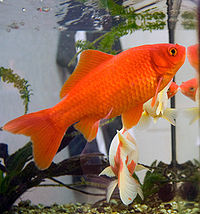 | |
Indian carp | Catla catla | 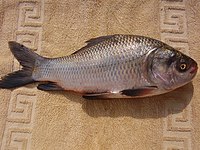 | |
Grass carp | Ctenopharyngodon idella | 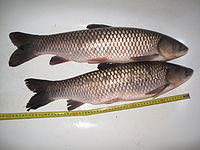 | |
Common carp | Cyprinus carpio | 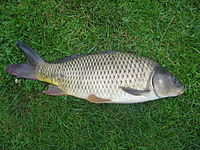 | |
Silver carp | Hypophthalmichthys molitrix |  | |
Mrigal carp | Cirrhinus mrigala |  | |
Rohu | Labeo rohita | 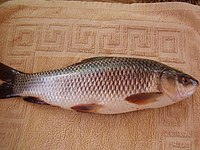 |
Order: Salmoniformes - Salmons
Family: Salmonidae
All salmonids spawn in fresh water, but in many cases, the fish spend most of their lives at sea, returning to the rivers only to reproduce. This lifecycle is described as anadromous. They are slender fish, with rounded scales and forked tails.
| Name | Binomial | Status | Image |
|---|---|---|---|
Rainbow trout | Oncorhynchus mykiss | invasive |  |
Order: Cyprinodontiformes - Toothcarps
Family: Poeciliidae - Guppy and swordtails
They are extensively used for mosquito control, poeciliids can today be found in all tropical and subtropical areas of the world.
| Name | Binomial | Status | Image |
|---|---|---|---|
Mosquitofish | Gambusia affinis |  | |
Guppy | Poecilia reticulata |  | |
Green swordtail | Xiphophorus hellerii | 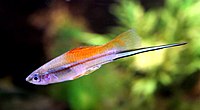 | |
Common platy | Xiphophorus maculatus | 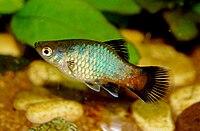 |
Order: Perciformes
Family: Cichlidae - Cichlids
Cichlids are popular freshwater fish kept in the home aquarium. Cichlids tend to be of medium size, ovate in shape, and slightly laterally compressed, and generally similar to the North American sunfishes in morphology, behavior, and ecology.
| Name | Binomial | Status | Image |
|---|---|---|---|
Redbreast tilapia | Coptodon rendalli | 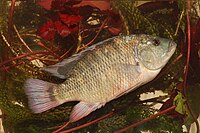 | |
Nile tilapia | Oreochromis niloticus |  | |
Mossambique tilapia | Oreochromis mossambicus | 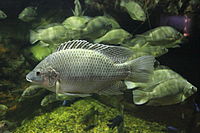 | |
Wami tilapia | Oreochromis urolepis | ||
Redbelly tilapia | Tilapia zillii |
Family: Osphronemidae - Gouramis
Many gouramis have an elongated, feeler-like ray at the front of each of their pelvic fins. Many species show parental care: some are mouthbrooders.
| Name | Binomial | Status | Image |
|---|---|---|---|
Snakeskin gourami | Trichopodus pectoralis |  | |
Three spot gourami | Trichopodus trichopterus | 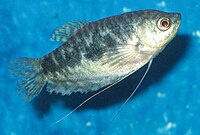 | |
Giant gourami | Osphronemus goramy |  |
Family: Helostomatidae - Kissing gouramis
Single species is known. The kissing gourami is a popular aquarium fish.
| Name | Binomial | Status | Image |
|---|---|---|---|
Kissing gourami | Helostoma temminckii |  |
Order: Siluriformes - Catfishes
Family: Loricariidae - Suckermouth fishes
These fish are noted for the bony plates covering their bodies and their suckermouths. They are popular as aquarium fish.
| Name | Binomial | Status | Image |
|---|---|---|---|
Sail-fin pleco | Pterygoplichthys multiradiatus |  |
Order: Osteoglossiformes - Bony tongues
Family: Notopteridae - Knifefishes
Known as knifefish or featherbacks, have slender, elongated, bodies, giving them a knife-like appearance. The caudal fin is small and fused with the anal fin, which runs most of the length of the body. Where present, the dorsal fin is small and narrow, giving rise to the common name of "featherback".
| Name | Binomial | Status | Image |
|---|---|---|---|
Clown knifefish | Chitala ornata | invasive | 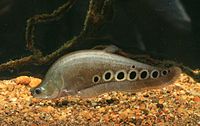 |
References
- http://biodiversityofsrilanka.blogspot.com/p/freshwater-fish-diversity-of-sri-lanka_29.html
- http://www.fish.lk/
- http://www.environmentmin.gov.lk/web/images/pdf/freshwater%20fish.pdf
- http://www.multifishlanka.com/brackish-water-fish.html
- http://www.naqda.gov.lk/brackish_water.php
- https://www.scribd.com/doc/15883696/fisheries-and-fish-sp-in-sri-lanka
- http://www.sundaytimes.lk/030615/funday/2.html
- http://www.ceylontoday.lk/18-19330-news-detail-invasive-aliens.html